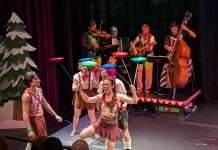Last week, I posted conversations with a few co-op families about their co-op experiences to give you a full lay of the land about what it means to be involved in a parent-cooperative model. Now, I want to share an interview with Claire Koukoutsakis. Claire is a Child Development Instructor at Foothill College, Founder of Foothill’s Mentor Teacher program, and the Director of Mountain View Parent Nursery School.

MPMB: What is the co-op model? What is a parent co-op?
Claire: Parent co-ops are pretty similar philosophically and tend to be “play-based,” but they each have their own individual personality. It’s really what the richness that the parents bring to the program, through leadership, through working with the children in the classroom, and how valued the parents are for what they can contribute to the program. This makes each program unique – because of the families that are part of them! And the way that each individual teacher brings that into fruition, as well. I think that’s a large part of it. The relationships and community that is built in the parent co-op: for parents to become part of a community, to have support, is nothing you can get anywhere else, in any other kind of program. Getting to know the other children, the other families, through actually working in the school, is such a special gift. And the support. So, if you are in a time of need, the other families are there to support you. For all the families that come from living all over the world, having families so far away, this support is really so crucial. It really is just such a supportive way to parent – to have this group of people that there might be in your neighborhood – it’s your neighborhood, it’s your “people.” You walk in and you’ve been up 3 times in the night, and you can find 5 other people right away for whom that’s the same situation! And that can be lonely, otherwise!
The other thing I think to some people is that the tuition is lower because of the time you put in and the contribution to the program. So that’s important, and I think that relationship – working with the teacher, that then as your child grows up and when you go through the school system, you feel much more comfortable being in the classroom, working with other children, taking leadership roles in sports and working in groups – because you have been involved in the co-op. You may have more confidence and take on more leadership roles – we’ve nurtured many leaders in the community!
MPMB: That’s sort of one of those added benefits that people don’t really think of – “I’m going to get all this experience actually creating community and leading,” but that’s not necessarily a role for everyone…
Claire: No, some people want a job that they can use on their resume when they return back to work, or they want to develop specific work skills.
Another big benefit of the parent co-op is the lower adult-child ratio. A normal pre-school is 1 adult to 8 or 12 children. Ours is normally one adult to 2-3 children. So that does allow for so much more freedom for the children, for activities that they can choose from, because there’s so many adult facilitators.
MPMB: That’s interesting – of course, having more adults actually opens up the environment – so that more children can explore more of their environment. It’s not that there are more adults “helping” them explore, but that they can do it themselves.
Claire: In a normal pre-school model, there is no possible way you could do all day, indoor-outdoor – there is no possible way! You don’t have the coverage!
MPMB: Are there co-ops that are specifically purporting different philosophies? Or is the co-op model sort of its own model?
Claire: Well, most parent co-ops are normally “play based,” but, having said that, the richness of early childhood is to choose the good in all of the different philosophies and bringing in elements of, say, Montessori and Reggio-Emilio… and having access to all these different philosophies, different materials, and projects, is great for parents, of course!
MPMB: What does it mean to be a play-based program?
Claire: It is that young children learn best through play. They need hands-on manipulation, they need to make sense out of the world in which they are living, and they do that through play. They need that open-ended materials to create and build that foundation for learning. And then the whole child: social/emotional, cognitive, movement, the language… all of it together.
MPMB: What would you say to a parent looking into a preschool who’s asking specific questons about curriculum and academic preparation for kindergarten.
Claire: What adults look at as play is different… with children, if they are in an environment that allows them, for example, to spend a large block of time that they can choose how long they can stay in the activity or if there’s an adult that can ask them open-ended question and scaffold them to a higher level of learning, then they grow this love for learning. The confidence to make decisions about how they want to spend their time and for how long are skills that they can take for the rest of their lives. They become responsible for their learning, vs. being told information and then to spit it back out. THey are hands-on learners.
MPMB: How about some of the drawbacks – when is a co-op not right for someone?
Claire: Well, it is more challenging for two parents who work full-time. Many parents are able to juggle it with their schedule. But we can’t be their only source for childcare. But there are a couple of models, for example, Geo-kids, and they’re a co-op model that is a full-time program, and Children’s Center for the Stanford Community (CCSC) – but that part is a challenge.
You have to be willing to put in the time.
MPMB: From what ages can a co-op benefit a child/family?
Claire: Definitely from 2 years through elementary! The preschool model is 2-5, but there are many successful parent participation models in schools. With parent co-operative, it’s more involved in the whole running of the program. Parent participation is just the participation in the classroom.
MPMB: What does it mean that MVPNS is NAEYC-accredited?
Claire: NAEYC (National Association for the Education of Young Children) is our professional organization for early childhood educators. You choose to go through this program, and there are about 200 criteria that you must meet and prove to become accredited. It can be used to improve your program, train your staff, and improvement for our employees- staff training, etc. The idea really is that it’s this higher quality above licensing. The other thing that’s important is that i think it’s about 8% in the U.S. that are accredited. We are one of a handful in the area. We have a very highly trained, dedicated staff. Our environment – we are so lucky to have such a large space, a large outdoor space for children to explore. We also have a connection with the local high school and with Foothill College. We have aides who come from the high school and are getting credit. If you’re a child development major, you’re required to do student teachers, so we provide a training environment under our teachers. We run a really high-quality program and we continue to learn and teach and train our staff, and the richness grows.

















